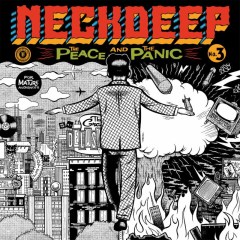Post-hardcore quartet Counterfeit Culture has released a music video featuring Ricky Armellino of This Or The Apocalypse, for their single, “Apothecary“. The video showcases a violent relationship which highlights the message of the band’s recently released EP titled, Deathwish.
Guitarist, Patrick Robertson talked about the video saying, “This music video is the most meaningful thing of the whole release for all of us. We spent so much time planning out the storyboard, and drove all the way to Lancaster, PA to film part of it. Of course having our good friend Ricky Armellino in it makes it that much more special to all of us. We wanted to follow up on our music video for X, and put out something that’s just as impactful. Alec and Kiera, the actor and actress in this video did an absolutely amazing job portraying an abusive relationship. This is a culmination of all our hard work, and we hope everyone can get something out of it!”
Deathwish which dropped August 1st. was produced and engineered by Armellino and gives off the melodic metal vibes and harmonious vocals that will remind listeners of This Or The Apocalypse. Watch the new music video for “Apothecary” below and stream the rest of Deathwish HERE.
About Counterfeit Culture:
Facebook | Instagram | Twitter
In this day and age, we’re constantly bombarded by an onslaught of overwhelming influences from the entertainment industry and the media. It’s inescapable. Standing out from the pack becomes a bold proposition and an even bolder move. That’s where Counterfeit Culture come in. Not only do the New Jersey quartet—Nick Broglio [vocals], Patrick Robertson [guitar], Elijah Pagan [bass], and Chris Smith [drums]—shake up heavy music, but they also shake up pop culture at large, ripping conventions to shreds with an artful amalgam of intricate metallic musicianship and alternative-inspired melodies. Their 2017 Deathwish EP introduces an infectious ideology.
“The name Counterfeit Culture basically says that we live in a society where TV shows, movies, magazines, and web sites tell us how to dress, how to act, and how to live our lives,” says Patrick. “Society tries to force you to be a certain way. We’re saying that’s wrong, and you can be whoever you want to be and live life however you want.”
The members initially met in 2015 while still in high school. They quickly built a local buzz, performing with top-notch acts such as Suicide Silence, Whitechapel, Like Moth To Flames, The Plot In You, Erra, Thy Art Is Murder, Invent, Animate, and many more. In 2017, they worked with producer Ricky Armellino [Currents, This Or The Apocalypse] and mixer Taylor Larson [Periphery, Darkest Hour] on what would become Deathwish.
“We take inspiration from multiple genres,” the guitarist goes on. “Of course, we’re a heavy band, and we’ve got those down-tuned breakdowns. At the same time, there are melodic riffs and singing with layers of vocal harmonies. It’s this mix between alternative and metal.”
The single “Apothecary” illuminates the nuances of that style. Snapping from precise polyrhythmic pummeling into hypnotic harmonies, it consciously speaks up against domestic violence lyrically and in its cinematic music video.
“The lyrics are about pretending to be someone you’re not and trying to sell yourself as someone you’re not,” explains Nick. “The music video tells that story of domestic abuse. We gave it visual representation. It’s a girl in this abusive relationship, making it seem normal. Obviously, she’s in pain, but she doesn’t show it.”
Elsewhere, “X” tackles the horrors of drug addiction through a tightly woven sonic assault, “Second Soul” examines “the self-destructive death of one’s former self.” The band separates itself from their contemporaries through both the integration of melody and a fashion-conscious image, eschewing the typical “black t-shirt and jeans,” as Patrick puts it.
Drawing inspiration from remaining outsiders since growing up through and through, Deathwish is as real as heavy music gets. “When people hear this EP, I hope they think about how they’re living their lives and open their eyes,”Patrick concludes. “You don’t have to just do things the way your favorite actor does. Take our songs as inspiration to live your life how you want to live.”
“The songs come from an honest place,” Nick leaves off. “They talk about my past. I felt myself change as a person. I want other people to know that change is possible.”
Tags: ”Apothecary", Counterfeit Culture, Deathwish, Ricky Armellino, This Or The Apocalypse












 Share On Facebook
Share On Facebook Tweet It
Tweet It






